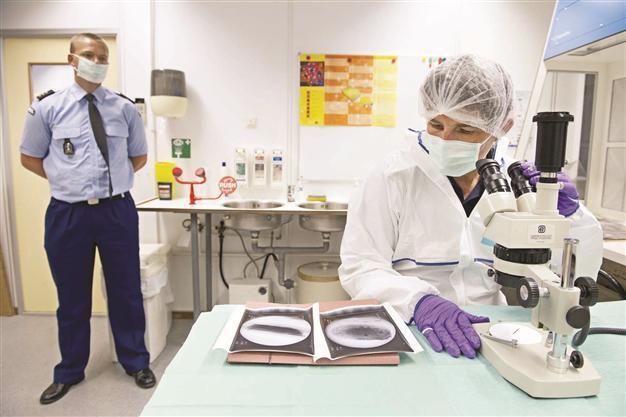US trains Afghans in crime-solving tech
KABUL

A forensic expert of the Dutch Royal Military Police examines images of a needle that were recently found in the sandwiches served on flights of the US ‘Delta’ airlines. EPA photo
The U.S. military plans to teach Afghan police the latest crime-solving laboratory techniques in a forensic academy built by Washington in Kabul, Daily Telegraph reported.Afghan police will receive training on DNA profiling and fingerprint analysis in a training program which could result in catching Taliban bombers as well as other criminals, the newspaper reported. The training program comes as NATO begins withdrawing its remaining soldiers from the country for a complete withdraw by 2014.
NATO currently has around 200 of its own forensic experts in seven military laboratories, working to gather evidence from insurgent suspects, homemade bombs and found mobile phones, according to the daily. When these laboratories scale back, Afghan authorities will be left without the ability to gather or interpret forensic evidence themselves.
Lt. Col. Syed Rahmatullah Qureshi, the Afghan police’s chief forensic expert, estimated that only 40 of his officers had ever received training. Much of what their officers learned more than 20 years ago came from Soviet advisers and was now outdated or forgotten.
To leave Afghan forces better equipped the United States has built the Afghan Criminal Techniques Academy, a rather plain-looking $1.3 million single-story block beside Bagram airfield, north of Kabul. Here experts from laboratories, police departments and sheriffs’ offices across the U.S. are trying to train Afghan technicians.
‘Same techniques in the US’
Classes at the Afghan Criminal Techniques Academy include lessons on ballistics, comparing bullets and weapons, gathering DNA evidence, crime-scene photography, fingerprinting and how to extract data from mobile phones and computers. “We are using the same type of equipment and the same techniques we would use ourselves,” Paula Clifton, who has 23 years of experience working in U.S. DNA labs, said, according to daily Telegraph.
Senior U.S. officials behind the academy have admitted the limited scale of their job. “We’re not trying to give them the FBI all at once,” said Rear Admiral James Crawford, who has led the coalition’s efforts to bolster the Afghan justice system. The forensic academy is scheduled to be handed over to Afghan control by the end of 2013.
















